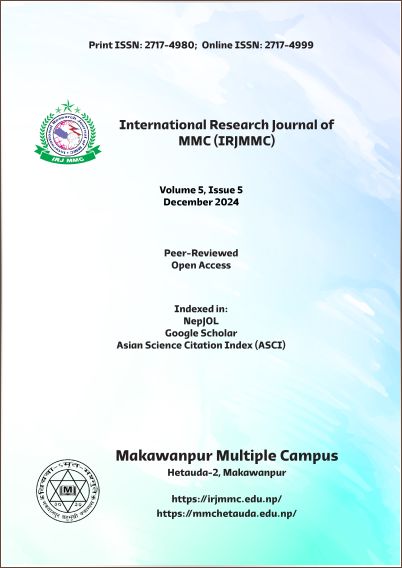An Empirical Study on E-Commerce and Its Determinants in the Context of Nepalese Small and Medium Enterprises
DOI:
https://doi.org/10.3126/irjmmc.v5i5.73701Keywords:
Adoption of e-commerce, Small and medium enterprises, Pedagogy, Technological readiness, Adoption cost, Entrepreneurial competenciesAbstract
This study explores the factors driving e-commerce adoption among small and medium enterprises (SMEs) in Nepal. It highlights critical determinants influencing the adoption process, such as technological readiness, cost considerations, government support, and entrepreneurial competencies. The research aims to assess the status of these determinants, analyze their interrelationships, and evaluate their collective impact on e-commerce adoption. Employing a descriptive and causal research design, data were collected from 426 SMEs within the Kathmandu Valley region using structured questionnaires. Statistical analyses, including correlation and regression, were conducted with SPSS to explore the connections between the identified factors and the adoption of e-commerce. The survey was conducted in August 2024 through a convenience sampling method, and a casual research design was applied. The findings reveal that technological readiness, adoption cost, and entrepreneurial competencies significantly influence e-commerce adoption among SMEs, whereas government support has a minimal positive impact. These results highlight the need for improved technological infrastructure, cost-effective solutions, and targeted government policies to promote e-commerce adoption. This study enhances the understanding of e-commerce adoption in developing contexts and economies. It offers practical insights for policymakers, business owners, and researchers interested in the digital transformation of SMEs.
Downloads
Downloads
Published
How to Cite
Issue
Section
License
Copyright (c) 2024 The Author(s)

This work is licensed under a Creative Commons Attribution-NonCommercial 4.0 International License.
This license enables reusers to distribute, remix, adapt, and build upon the material in any medium or format for noncommercial purposes only, and only so long as attribution is given to the creator.

